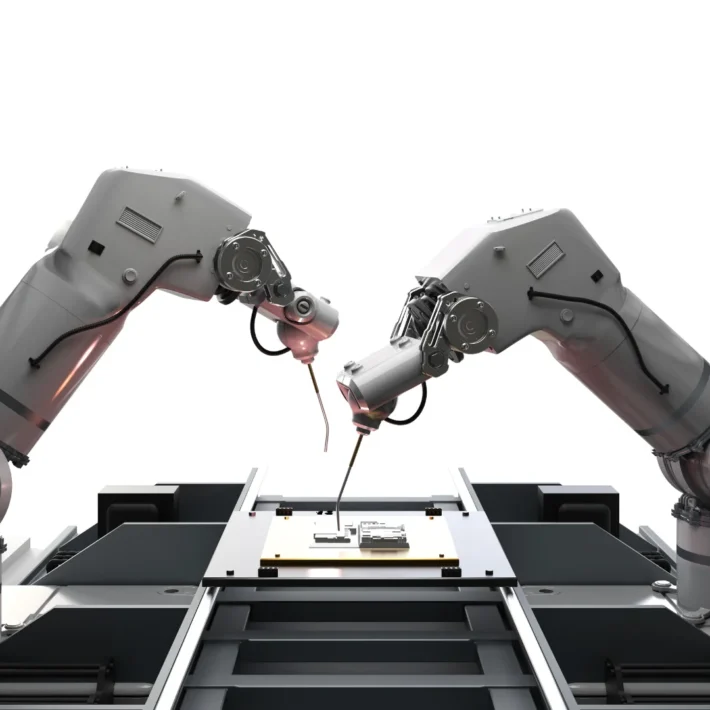What is Intelligent Automation (IA): Benefits, Features & Examples

Intelligent Automation (IA) is revolutionizing how businesses operate by combining artificial intelligence (AI) with automation technologies. This powerful synergy enhances operational efficiency and streamlines complex tasks, making it a cornerstone of modern business strategy. In this article, you’ll learn about the definition of IA, its key components, and the significant benefits it brings to various industries.
Understanding Intelligent Automation (IA)
What is Intelligent Automation?
Intelligent Automation (IA) integrates AI with automation tools to perform tasks that typically require human intelligence. This involves the use of Robotic Process Automation (RPA), Business Process Management (BPM), and cognitive technologies like Machine Learning (ML) and Natural Language Processing (NLP). Together, these components create systems capable of automating intricate processes with precision and efficiency.
Components of IA
Robotic Process Automation (RPA)
RPA uses software robots to automate repetitive tasks based on predefined rules. These tasks can include data entry, transaction processing, and responses to simple customer queries. RPA enhances productivity by allowing employees to focus on more strategic activities.
Business Process Management (BPM)
BPM is a systematic approach to improving an organization’s processes. It involves modeling, analyzing, and optimizing business workflows. BPM ensures that operations are efficient, effective, and adaptable to changing business needs. When integrated with IA, BPM can manage and automate end-to-end business processes seamlessly.
Cognitive Technologies
Cognitive technologies such as ML and NLP enable IA systems to learn from data, recognize patterns, and make decisions. ML algorithms can analyze large datasets to provide insights and predictions, while NLP allows systems to understand and respond to human language. These technologies add an element of “intelligence” to automation, enabling more complex and adaptive solutions.
💡Tip: Be among the first to gain new intel on the latest insights, industry trends, AI tools, and techniques for the problems we solve in the automation space. [Click here to subscribe].
Key Features of Intelligent Automation Tools
Enhanced Decision-Making Support
Intelligent automation tools leverage AI to provide enhanced decision-making capabilities. By analyzing data and identifying trends, these tools can offer recommendations and automate decision processes, leading to more informed and timely actions.
Automation of Repetitive Tasks
RPA excels in automating repetitive tasks that follow set rules. This not only speeds up execution but also reduces the likelihood of errors. For example, automating invoice processing can significantly cut down the time required, ensuring faster and more accurate outcomes.
Streamlined Workflows with BPM
BPM tools manage and optimize workflows, ensuring that tasks are completed efficiently and correctly. By modeling processes, identifying bottlenecks, and implementing improvements, BPM enhances overall operational performance. When combined with RPA and cognitive technologies, BPM can create highly efficient, end-to-end automated workflows.
Benefits Realized through Implementing Intelligent Automation Solutions
Increased Efficiency
Organizations that adopt IA solutions often experience significant efficiency gains. For instance, automating invoice processing can reduce the time required from days to mere hours. This increased speed allows businesses to respond more quickly to market demands and customer needs.
Cost Reduction
Implementing IA can lead to substantial cost savings. A case study of a manufacturing company showed that automating routine tasks resulted in a 30% reduction in operational costs. By minimizing manual intervention, businesses can allocate resources more effectively and reduce expenses associated with errors and inefficiencies.
Enhanced Accuracy and Customer Experience through Intelligent Automation Adoption
Improved Accuracy
Intelligent systems can enhance data accuracy by minimizing human errors. For example, automating data entry ensures consistent and error-free records. Statistics show that businesses adopting IA experience a significant decrease in error rates, leading to more reliable data and better decision-making.
Enhanced Customer Experience
AI-powered chatbots are an excellent example of IA improving customer experience. These chatbots can handle a wide range of customer inquiries, providing personalized and immediate responses. A real-world example is a financial institution that implemented AI chatbots, resulting in higher customer satisfaction scores due to faster and more accurate service.
Scalability Benefits Offered by Intelligent Automation Technologies
Scalability
IA technologies enable organizations to scale their operations without compromising quality or increasing risk. For example, a case study of a retail company demonstrated how IA allowed them to handle peak shopping periods without additional staffing costs. The automated systems managed increased workloads efficiently, maintaining service quality.
Practical Applications Across Industries: Real-World Examples of Intelligent Automation in Action
Healthcare Sector
In healthcare, IA has been instrumental in improving operational efficiency. Patient scheduling automation and streamlined medical billing are two areas where IA has made a significant impact. For instance, a hospital implemented IA for patient scheduling, reducing appointment wait times and improving patient satisfaction.
The Future Landscape Shaped by Intelligent Automation Technologies
Emerging Trends
The future of IA is shaped by emerging trends such as ethical AI practices. Ensuring fairness and transparency throughout the development and deployment of IA solutions is crucial. This includes addressing biases in AI algorithms and ensuring that automation benefits all stakeholders equitably.
Frequently Asked Questions about Intelligent Automation Implementation Strategies and Considerations
What Industries Stand to Gain Most from Embracing Intelligent Automation Solutions?
Industries such as finance, healthcare, and retail stand to gain significantly from IA technologies. These sectors often have complex and repetitive processes that can be efficiently automated, leading to cost savings and improved service delivery.
How Can Organizations Overcome Challenges When Implementing Intelligent Automation Initiatives?
Organizations can overcome implementation challenges by adopting a phased approach, starting with pilot projects to demonstrate value. It’s also essential to ensure proper integration with existing systems and to involve key stakeholders in the planning and execution phases.
Conclusion
Intelligent Automation offers transformative potential across various business functions. By integrating AI and automation technologies, organizations can achieve significant efficiency gains, cost savings, and enhanced customer experiences. However, it’s crucial to consider ethical AI practices to ensure fairness and transparency in automation solutions. Embracing IA can lead to a more efficient and responsive business environment, paving the way for future innovations.
One comment
Comments are closed.



[…] AI automation in mobile app development has become a game-changer, transforming how developers approach app creation, testing, and maintenance. The integration of AI tools into development workflows offers unmatched efficiency, enhanced user experiences, and the ability to predict and adapt to future trends. This article delves into the many advantages of adopting AI automation in mobile app development, providing you with insights into why it’s not just a trend but a necessity in today’s tech landscape. […]